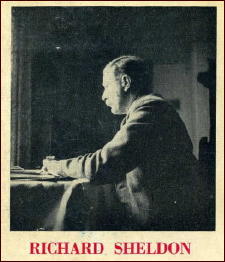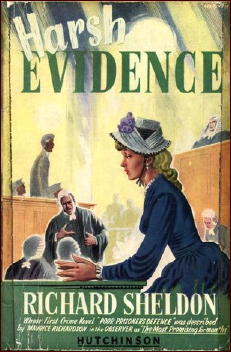Fri 8 Jul 2011
Jamie Sturgeon has continued to search out details of the life of Richard Sheldon, author of Poor Prisoner’s Defense, a mystery novel published in England in 1949. Bill Deeck’s review appeared here on this blog earlier this week.

To this end Jamie has purchased a copy of Harsh Evidence, Sheldon’s second book and final crime novel, and with some success to show for it. A photo of the author is shown to the right, along with the biographical blurb I’ve transcribed and posted below.
There seems to be sufficient detail here to track down more about Richard Sheldon; indeed if more is learned that may be of general interest, I’ll report about it here.
So much for conventional biographical details! They relate to a man who has at one time been a barrister, university Don, free-lance journalist, a rather amateurish soldier and even a member of a Rural District Council. Of all the occupations in which he has been engaged, Richard Sheldon finds writing at once the most exasperating, the most demanding and the most enthralling.
His first novel, Poor Prisoner’s Defence, published in 1949, was not written until he found himself for some months in a military hospital during the war. “Richard Sheldon is to be commended to the connoisseur of thrillers,” said the Daily Telegraph; while Maurice Richardson of The Observer wrote: “One of the most promising first crime stories for many months … Don’t miss!”
[UPDATE] 07-09-11. Jamie has just sent me a cover scan for Sheldon’s second book. Here it is:

[UPDATE #2] 07-15-11. John Herrington has inquired of Random House, current holder of the Hutchinson archives, and he reports back that “Richard Sheldon” is a pseudonym; his real name bears no resemblance to it.
(Random House cannot say more, because of a data protection act, or so I’m told.)
July 9th, 2011 at 1:39 pm
I assume you have check the genealogy sites such as ancestry.com?
July 9th, 2011 at 1:49 pm
I can’t speak for Jamie about that one, but if you’re trying to track down someone who lived in the UK, the best first step for basic biographical data is FreeBMD.com, which according to their website, “is an ongoing project, the aim of which is to transcribe the Civil Registration index of births, marriages and deaths for England and Wales, and to provide free Internet access to the transcribed records.”
So far, none of the Richard Sheldon’s found there (born circa 1905) have panned out to be the one who grew up to be the author.